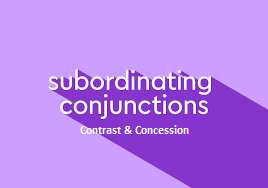News & Events
Subordinating Conjunctions (Contrast & Concession)
- 19 August 2023
- Posted by: admin-rashtielts
- Category: Grammar

Subordinating Conjunctions
(Contrast & Concession)
Clauses of Contrast are dependent clauses used to describe conditions or events that are different than expected. Although, even though, though, despite, in spite of, while, and whereas and are commonly used to link sentences for showing a contrast.
- Although it rained a lot, they had a good time.
- Even though I was really tired, I couldn’t sleep.
- We enjoyed the movie although/ even though/ though it was long.
- In spite of being 85, she still travels all over the world.
- Despite her age, she’s really active.
- While there was no conclusive evidence, most people thought he was guilty.
- The old system was fairly complicated, whereas the new system is very simple.
1. Although, even though, though
These are common for making a contrast. We usually use though in middle of the sentence. Even though is more emphatic than although. Though is more common in informal speech.
- I didn’t apply for the job though I had the necessary qualifications.
- Even though I was really tired, I couldn’t sleep.
- Although the traffic was awful, we arrived on time.
2. Despite, in spite of
After in spite of and despite we use a gerund, a noun, or the fact that + clause
- In spite of the rain, we had a good time.
- Despite the terrible economic condition, I could afford to buy a new car.
- I didn’t apply for the job in spite of having the necessary qualifications.
- I didn’t apply for the job in spite of the fact (that) I had the necessary qualifications.
Warning:
We don’t usually use a comma for these words when they’re in the middle of the sentence. Only when we start the sentence.
3. While, whereas
These are other linkers for this purpose:
- While I like all types of fish, my girlfriend always chooses meat dishes when we go out.
- Some married couples argue all time, whereas others never do.
Warning:
If you’re using “while” to mean “although” or “whereas,” you need a comma.
Example: “While” meaning “whereas”
- Some people enjoy traveling, while others prefer to stay home.
Generally, a comma always belongs before whereas.
- The old system was fairly complicated, whereas the new system is very simple.
Using a comma with subordinating conjunctions:
- I thought it was an amazing movie. It was really depressing, though.
- Susanna is an only child even though she isn’t at all spoiled.
- In spite of our seats, we enjoyed the show.
- Although it rained a lot, they had a good time.
- Sam accepted the job in spite of the salary, which was rather low.
- He loves foreign holidays, whereas his wife prefers to stay at home.
- While I like all types of fish, my girlfriend always chooses meat dishes when we go out.
Javidan Language Centre
www.rashtielts.ir
